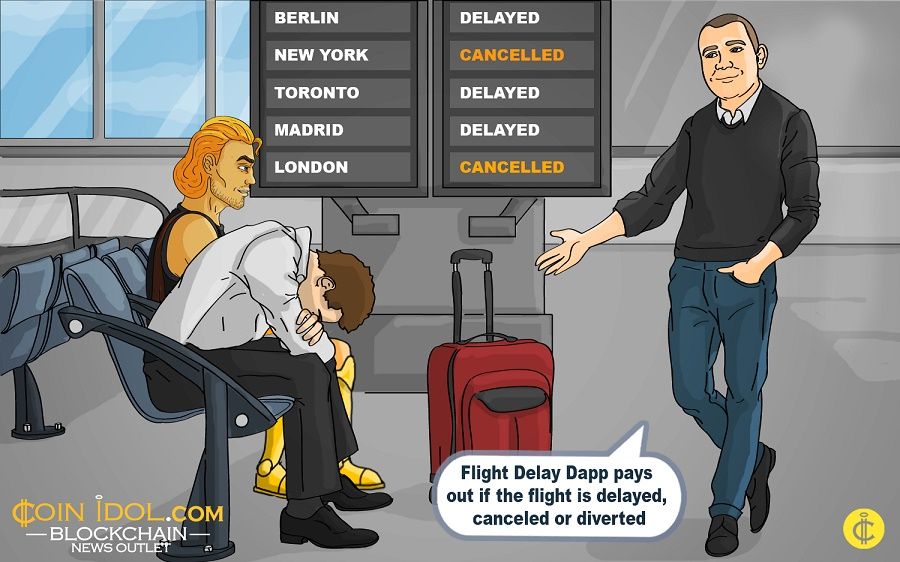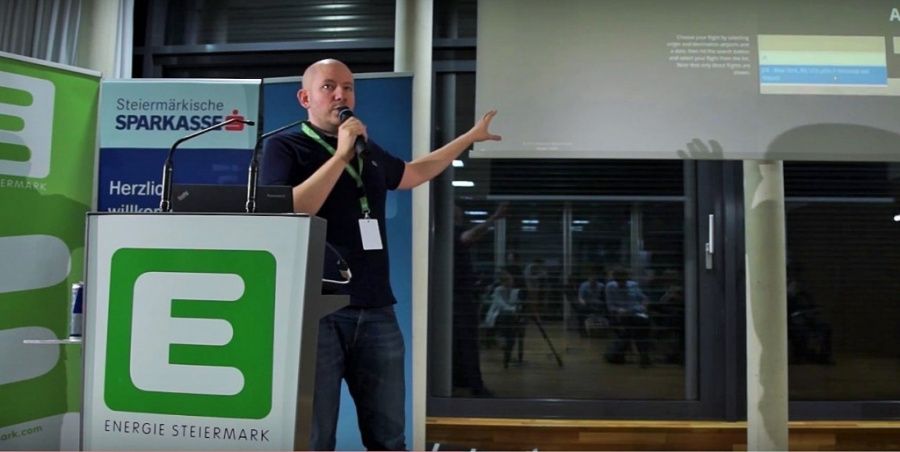Etherisc Smart Contracts for Disrupting Parametric Insurance
Updated: Oct 29, 2017 at 07:13

Insurance companies are always searching for the best ways to serve their customers. They have to be efficient, to give access to consumers and investors, but at the same time have to lower costs.
At the Blockchain Startup Contest, we learned of Etherisc - a decentralized insurance application.
Coinidol’s correspondent reached out to
Dr. Stephan Karpischek about the experimental project Flight Delay Dapp and presents his answers to our readers.
Dr. Karpischek is a co-founder of
Etherisc together with
Christoph Mussenbrock. He is also a digital strategist at disrupt consulting and has more than 20 years experience in IT businesses. He advises finance and telecom enterprises on digital strategy. In 2015, he was part of the of the UBS crypto 2.0 innovation lab at Level39 in London. Stephan has been working on digital currencies since 2008 and holds a Ph.D. in Information Management from ETH Zürich.
CoinIdol: Which geographical areas can the Flight Delay Dapp be applied to?
Stephan Karpischek: Globally, the only restriction is that we need to have historic data for the flight to calculate probabilities.
CI: Would the Flight Delay Dapp be compliant with the EU travel regulations?
SK: I suppose you mean EU regulation 261/2004? Airlines are obliged to compensate passengers for denied boarding, long delays and cancellations. The flight delay dapp does not interfere with these regulations.
CI: Let’s assume there are strikes next week and you cannot fly out to your pre-booked holiday to Greece, for example, would you be covered?
SK: If the flight is canceled, yes.
CI: Although the FCO are warning people to stay away from any demonstrations, if someone were to get caught up in one and were injured or robbed, would they be covered?
SK: I think this is not related. Flight delay dapp only pays out if the flight is delayed, not if someone misses the flight for whatever reasons.
CI: What if you can’t get home as there are no flights and you have to stay in the country longer than planned – are you covered for the extra expenditure?
SK: No, the payout sum is fixed and correlates to the probability of the flight being delayed, which is calculated from historic data. Flight Delay Dapp only pays out if the flight is delayed, canceled or diverted.
CI: Would the user have the option of canceling the policy, how will this affect the Flight Delay Dapp?
SK: We had a function to revoke the policy, but it's not in the current implementation. We had to take it out to reach the gas limit.

CI: If this is a successful model, will you expand it further to passenger ships?
SK: We have not looked into that yet. Are delays and cancellations an issue with passenger ships.
For us, flight delay is an ideal use case and a good example for a parametric insurance in a smart contract, it has many desirable properties: Individual risks are relatively small, relatively independent, and claim verification can be fully automated. We use Flight Delay Dapp to demonstrate the benefits of a decentralized insurance. In the future, we want to expand this model to other insurance verticals such as crop insurance, weather insurance, life and health insurance and also mutual peer-to-peer insurances which require a human validating claims.
We are currently working on implementing the investor side of the insurance market in a hackathon project at
hack.ether.camp and have just recently released a whitepaper, the current draft is
here.
CI: All insurance policies contain restrictions and exclusions that you should know about, will Flight Delay Dapp notify the user?
SK: Flight Delay Dapp gives immediate feedback if basic conditions are not met, e.g the flight is not at least 24 hours in the future. All restrictions are in the contract code. There are no other restrictions.
CI: Could someone predict airline delays, and if this does occur, how will the smart contract prevent this?
SK: If someone can predict a flight delay more than 24 hours in advance, he or she can, of course bet on that flight. The contract can't check this but limits the total payout per flight. Another way to hinder gambling is to require the user to prove possession of a valid ticket. This will lower the risk of users gaming the system.
CI: What are the highest and lowest cash limits that you cover on an average policy?”
SK: The current implementation limits the premium to a value between 0.5 and 5 ETH. The maximum payout is 200 ETH.
CI: What about for any investors, where can they buy the token or is there a limitation to the amount of money they have to put in?
SK: Investors can back the etherisc hackathon project and buy
tokens according to the rules in the hack.ether.camp whitepaper, there is no limit in the amount of money. If investors want to buy tokens for HKG they need to be quick. Sale will end on Thursday 22 Dec 1400 GMT.
CI: How can you guarantee any payment with a token?
SK: Same as with Ether, the smart contract pays out based on the rules set
in the contract.
CI: Which insurance company will recognize a token as a currency?
SK: Any insurance company issuing tokens itself. We can have tokens pegged
to fiat currency, e.g. a Euro token, or stable coins.
CI: Since no legal authority can force any company to accept Bitcoin payments, why would they enable acceptance of a token like it?
SK: You don't need an authority to accept tokens. If you don't want to accept a token, you don't need to.
Price
Price
News
Price
Price

(0 comments)